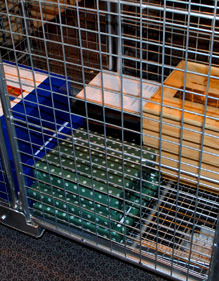|
Getting your Trinity Audio player ready...
|

The Gauteng provincial government has delivered on its promise – made in November 2014 – of bringing unprecedented levels of openness and transparency to the murky waters of its tendering processes.
The first public disclosure of a tender took place at the provincial treasury offices in Johannesburg on Friday, with that department being chosen to pilot the process. The tender involves the management of all banking transactions for the Gauteng government.
The Open Tender project was initially going to pilot in the provincial department of roads and transport, with the R50-million-plus upgrade of Cedar Road in Sandton, but the reason for the move away from this plan was not disclosed.
The winning bank will manage, among others, the payment of salaries of 200 000 public officials and supplier payments to the tune of about R3-billion per month, out of an estimated provincial budget of R90-billion for 2015. FNB is the current tender holder, but its five-year contract expires in 2016.
Spokesperson for finance MEC Barbara Creecy, Charles Phahlane, said that this would be a challenging trial run because the general pricing system for tenders is different to that of the banking tender. “We usually have a company and a price, but here we have different prices for different functions.” These include cash deposits, internet banking, and bank account verification.
The box containing a hefty tender from each of the big four banks – Standard Bank, Absa, FNB and Nedbank – was opened publicly, immediately after the closing of the tender at 11h00. The department’s deputy director for tender administration, Jaco Smit, led the process.
While representatives of the banks, other officials, members of the media and the public looked on, selected information from the tender documents was captured by trade and industry officials, in a spreadsheet which was projected onto a screen for easy viewing.
Initial confusion about decimal points and rands and cents lent the event a light-hearted start, but it was soon business as usual as the spreadsheet was populated and the prices from the bidders were compared. The BEE status of each bank was also disclosed.
At least one of the four banks, it transpired, had submitted expired tax clearance certificates – it is not known if or how this will affect their bids.
In addition, tender documents were stamped in public – this will avoid potential switching of crucial information later on.
Transparency
The bidders’ names have been published on the Open Tender webpage. The treasury has publicised a timeline, which outlines the expected completion of steps during the evaluation process, and also indicates when the tender will be adjudicated.
Each submission will be scrutinised by the bid evaluation committee, which will produce a shortlist. This will then go to the bid adjudication committee for consideration – the adjudication committee’s deliberations will be open to the public and it will take the final decision on the successful bidder.
It is anticipated that the tender will be awarded by mid-2015 to ensure a smooth transition and implementation by the successful bidder by 1 April 2016.
Lessons learnt from this process will be used to revise the Open Tender policy. Once the fine-tuning is complete, the policy will be taken to the Gauteng executive council for adoption and future use across the provincial departments.




